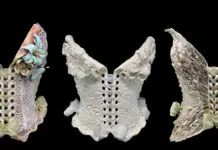On a Sunday a couple of months ago, at 11 p.m. sharp, listeners to Tulsa’s Z104.5 were greeted by something they might not have heard in a while – or ever. To longtime followers of Oklahoma’s music scene, however, the thrash-metal “Negative Reinforcement Training” by popular ‘90s Tulsa act Pit Bulls on Crack could only mean one thing – Davit Souders was back on Home Groan.
“On my very first Home Groan broadcast, back in ’96, I played ‘Negative Reinforcement Training,’” says Souders. “Part of the reason I did it was because Pit Bulls on Crack was a great band. I also did it because heavier music wasn’t being featured on Home Groan, and I thought, ‘Well, let’s set this straight.’
“Then, when I took over (KRSC’s) Local Flavors, that was the first song I played. It was the first song I played when I started doing (the podcast) Hometown Heroes. So, it seemed right to begin with it when I started on Home Groan again.”
If you discern a pattern in the titles of his shows, you’re correct. Souders has been involved in the Oklahoma music scene for the better part of three decades, and he’s long been obsessed with sharing that scene with those who may not know about it – or, if they do know about it, want more of it. For many years, he’s done this through whatever means have been available to him, including commercial radio, college radio and the internet. And now, he’s back where he started broadcasting 16 years ago, on the alternative-rock station Z104.5, The Edge.
Souders first entered the Tulsa music arena in the early ‘80s, when his job as lead vocalist for the rock band Lynx took him to a number of area venues, including the venerable Cain’s Ballroom. Although he continued to be involved as a performer, he’d soon branched out into booking talent for, and later managing, the ‘80s Tulsa club SRO.
In the 1990s, he started Diabolical Productions – the “diabolical” taken, he says, from an announcer’s line in the Batman TV show – and continued booking acts for his own club, Ikon, as well as for Cain’s. Because much of what he put on those stages fell into the modern-rock and alternative-rock categories, he ended up buying a lot of advertising on The Edge, which had changed formats from rock to alt-rock in 1995.
“Not long after they switched, (The Edge) decided they wanted to do a show that gave props to our awesome local music scene,” Souders says. “That’s when Home Groan started.”
The first host was musician Jarrod Gollihare, who would soon become a founding member of the long-lived band Admiral Twin. He departed after a few months.
“The station wanted a change of guard,” explains Souders, “and Paul Kriegler, who was the program director at the time, asked me to take over.
“A real tight relationship had developed with The Edge, (Cain’s owner) Larry Shaeffer and myself,” he adds. “Through our advertising with them and doing concerts together. Between what they were doing and what I was doing, it was a natural marriage. So in spring of ’96, I took over Home Groan. It was initially a 30-minute show, but after I took it over, it expanded to an hour.”
Running late Sunday nights, as it does now, Home Groan under Sounders quickly expanded beyond alt-rock into songs from a variety of genres, similar only in the fact that they were created locally.
“When you host a show, you’re always going to have your angle and spin on what you should play,” notes Souders. “Jarrod was doing his take, covering the aspects he thought should be covered, and when I took it over, I mixed in some other local music genres that I thought should be spotlighted – mariachi, Celtic, rock, blues, electronic, rockabilly, even ragtime. If it was local music, I tried to cover it.
“Sunday night shows can be like a red-headed stepchild, if you will. But the station really made sure to include Home Groan as one of its kids. When we did radio appearances, I could be with (morning-show hosts) Chuck (Stichel) and Greg (Koczak) or anybody else from the station, and I would get as much recognition as the others. That really added to its popularity, and the interest in it.”
The show flourished under Souders, who helped raise consciousness about Home Groan and area music by producing local-artist showcases at Ikon and Cain’s Ballroom. For a couple of years in the late ‘90s, there was even a spinoff program, Home Groan Live, a half-hour of music from a local act recorded live at Cain’s that followed Home Groan on the station.
Souders’ eight-year run as the show’s host ended, as radio jobs often do, with a general-manager change in 2004.
“It seemed like his agenda, as he saw it, was to make some changes – in some of the major salespeople, the program director, other positions at the station,” Souders says. “Somehow in all of that, I was included.”
Souders left in June of that year. And when the legendary Tulsa deejay John Henry died a few weeks later, he says, “It really hurt me that I couldn’t do a tribute to John Henry on a show. That’s the first time I was struck with how much I missed being on the radio.”
Discussions with other Tulsa stations about doing a similar program eventually came to naught, so in the summer of 2006, he started the weekly one-hour podcast Hometown Heroes, with co-host Dustin Parkhurst, creative director at Cox Media Group. Several months later, the two took over the iROK Radio podcast as well.
“It was the same format as Hometown Heroes, except that Hometown Heroes was specifically Tulsa, and iROK Radio included bands from all of Oklahoma,” explains Souders. “Thanks to my relationship with Dustin and all the fine folks at Cox, we were able to produce those shows at Cox Radio, which was an incredibly nice gesture.”
The Hometown Heroes podcast, he adds, went global, with a listenership of more than 200,000.
At around the same time, he got the opportunity to step in and host a radio show called Local Flavors at Rogers State University’s station KRSC (91.3 FM). “Interestingly enough,” says Souders, “the guy who started Local Flavors, Charlie Seven, told me, ‘You know, I started Local Flavors because I was inspired by your Home Groan shows.’ So it came full circle.”
None of these gigs paid anything, but that mattered little to Souders. As he says, “Whether it’s bringing a certain show to town or giving of myself for something, there are a lot of things I wouldn’t have done if it had just been about the bottom line. I don’t want anything, certainly not a couple of bucks, to keep me from presenting local music the way I passionately feel it should be done.”
So, when Paul Kriegler, back as Z104.5’s program director, recently offered him the chance to return to Home Groan – now a two-hour program – it was about a lot more than the money.
“The plus aspects were that I didn’t have to travel to Claremore twice a week, and I was getting paid again,” he says. “The Edge is five minutes from my house. It’s a major radio station. So the plus column just didn’t stop.
“The first night I went back,” he adds, “it all felt like yesterday. It felt like I was supposed to be there. It may sound cheesy, but it was truly magical.”

























